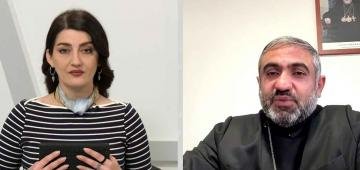 |
Father Paren ArakelyanWhat do we understand by the name of the basin?
|
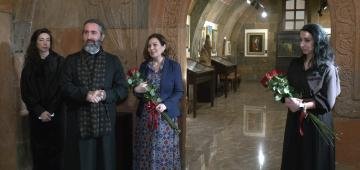 |
Hasmik Karapulyan's exhibition of paintings is on display at the Ruben Sevak Museum
The exhibited works are the works of Hasmik Karapulyan over the last two years. The art critic's series of paintings dedicated to ancient Armenian temples prove that the holy temples of the Armenian faith are not just a legacy of the past; standing or bowing, they always preach faith, hope, love and truth.
|
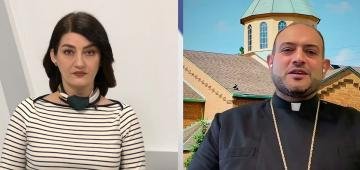 |
Rev. Fr. Hrach SargsyanWhy is there no Christmas tree in the Apostolic and Orthodox churches? |
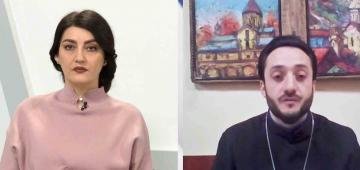 |
Fr. Kirakos Simonyan
What does Christ's description of you as the salt of the earth and the light of the world mean? Can the Church be involved in modern challenges?
Why does the Church use symbolic gestures?
How is the meaning of pain explained, especially for people living a Christian life?
What trials can a new believer face?
Why are church windows usually small and limited?
The questions of viewers and users were answered by Fr. Kirakos Simonyan. Write your questions on the "Questions and Answers" Facebook page
|
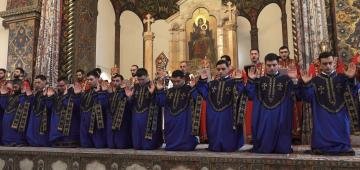 |
12 deacons ordained on the day of the commemoration of St. Stephen the ProtomartyrWith the blessing of the Patriarch of All Armenians, Bishop Vahan Hovhannisyan ordained 12 deacons at the festive Liturgy on the day of the commemoration of St. Stephen the Protomartyr. The newly ordained deacons, who also serve in various structures of the Mother See, were received by His Holiness Karekin II, Patriarch of All Armenians. At the end of the meeting, His Holiness answered the deacons' questions. |
 |
Rev. Fr. Hetum Tarverdyan
Why is love considered the greatest of the Christian virtues
What is the meaning of the believers giving incense to the deacon during the Last Supper
What does Christ say to his disciples about his second coming? Why is the birth of a child considered a sign of the Lord's blessing? How to fill the spiritual void How does faith affect a person's mental health
The questions of viewers and users were answered by Father Hetum Tarverdyan. Write your questions on the "Questions and Answers" Facebook page.
|
 |
Rev. Fr. Yeghishe NazaryanWhat is the difference between morning and evening services?
|
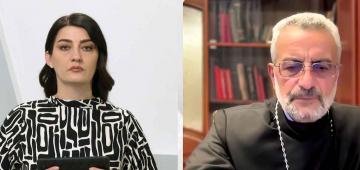 |
Rev. Fr. Mkrtich Yeranyan
What is the meaning of the dialogue between the deacon and the recipient during the distribution of blessed bread during the Liturgy?
Is there a Christian approach to hunger strikes?
Is it impermissible to greet clergy with a handshake?
Are the divine and human natures of Christ equally acceptable?
Can a meal with loved ones be called a “Love Meal”?
After giving life to Jairus’ daughter, why does Christ offer to give the girl bread, but not water?
Why is a crown placed on the heads of the newlyweds during a wedding?
Fr. Mkrtich Yeranyan answered the questions of viewers and users. Write your questions on the “Questions and Answers” Facebook page.
|
 |
Rev. Fr. Astvatsatur Sargsyan
Since when has giving a new name to a baptized person been practiced in our church?
Is it possible to participate in the rite of confession remotely, via the Internet?
What sources suggest that a clergyman cannot perform the rite for a suicide?
Why is the grave of women dug deeper than that of men?
Where are the stone tablets with the 10 commandments now located? T. Astvatsatur priest Sargsyan answered the questions of viewers and users. Write your questions on the “Questions and Answers” Facebook page.
|
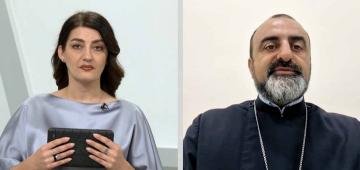 |
Father Vazgen Hovhannisyan
Where to start reading the Bible
What is Song of Songs about
Can illness have a spiritual basis
Why is there no mention of the story of Hayk and Bel in the Bible? Is it possible not to repent, but to approach communion
The questions of viewers and users were answered by Father Vazgen Hovhannisyan. Write your questions on the “Questions and Answers” Facebook page.
|
 |
Hovhannes Chilingiryan Library Opens at Gevorgyan Theological SeminaryThe Hovhannes Chilingiryan Library will operate in the Komitas Hall of the Gevorgyan Theological Seminary. The initiative was brought to life with the support of the daughters of the great Armenian, Shamir Avagyan Chilingiryan and Ani Srmakesh Chilingiryan. His Holiness awarded the spouses the highest order of honor of the Armenian Church, “Saint Gregory the Illuminator.” |
 |
Rev. Fr. Andreas Karapetyan
Is it possible to wear a headscarf outside the church?
Who is the people of the covenant?
Is it possible to baptize a newborn without waiting for it to turn 8 days old?
Can prayer be considered atonement for sins?
When did the tradition of seeing off the deceased from the church begin? How does something become sacred?
Fr. Andreas Karapetyan answered the questions of viewers and users. Write your questions on the “Questions and Answers” Facebook page.
|